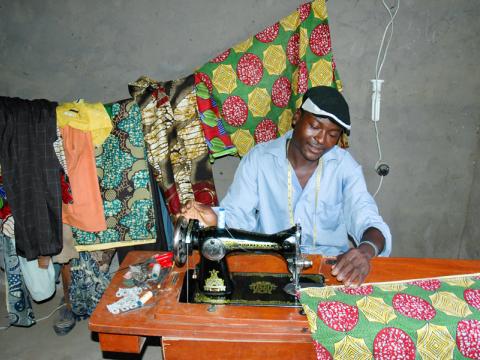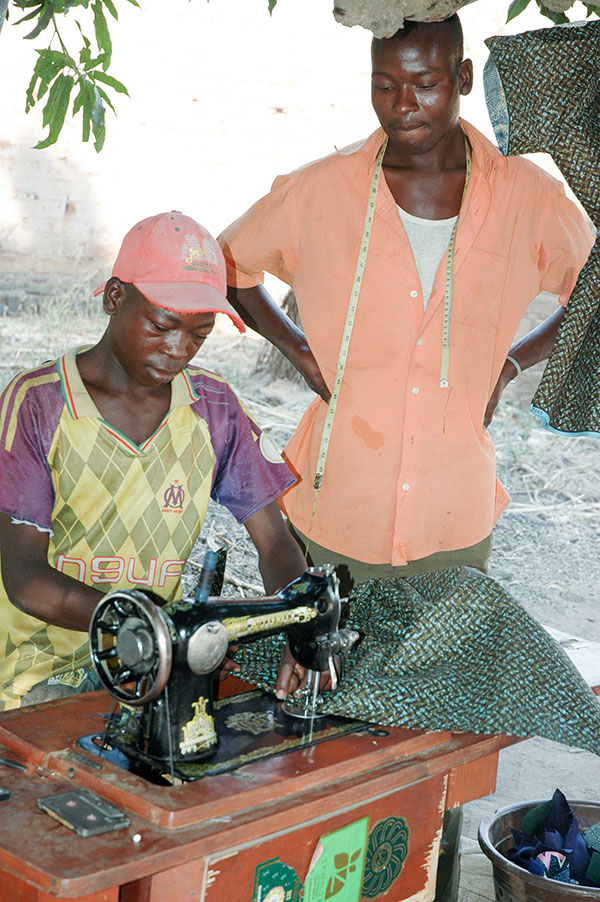From Sponsoring to Tailoring

When a World Vision sponsor offered Djekeme a chance at education, his parents decided to send him to tailoring school. A year later, "I returned in my village to become the first tailor of the village.” Today, the 13 people in the Tardoloum family depend on Djekeme’s activity to meet its food demand.
“When we were asked what kind of vocational training should be given to our child, we hesitate between tailoring and masonry. We finally decided that tailoring is appropriate for him because he was then young at that time. Today we are proud of this decision,” says Koutou Salomene, the mother of former sponsored child Djekeme Urbain.
Djekeme Urbain is one of the nine children that God blessed Tardoloum Bernard with. The family lives in Keikiro where the father is a Roman Catholic catechist.
“I am a farmer too but the soil is very poor these days and the crop production is very weak. Generally, we could not have enough food for the family during a whole year. Nine children would need a lot of food but we rarely get three bags of sorghum in a year. That has made life very difficult for us,” he explains. “We were very fortunate when World Vision came in and took my child Djekeme Urbain in its sponsorship program in 2002. Since that time, we have seen the difference that it made.”
Djekeme Urbain joined World Vision’s Gueni River Area Development Programme (ADP) at the age of 11. With the sponsorship programme, he was able to go to school and when he was sick, his parents just paid 20% of any medical fees.
“In 2006, I was sent to Moundou for one year of vocational training,” Djekeme says. “I was told that my sponsor asked if I wanted to learn something that can help the family. He sent the money to World Vision and I went for the training.”
World Vision provided me with a monthly scholarship of 20,000 fcfa to pay for my food and housing as well as the full payment of one year of training with a confirmed tailor.
“After one year, I was able to make pants and shirts but my teacher insisted that I should continue for another year. It was only at the end of November 2008 that I returned in my village to become the first tailor of the village.”
Three months later, Djekeme opened a workshop in his village. His sponsor provided him with 1,575.000 fcfa that was used to build a one room house with iron sheet roofs and tailoring equipments. Today, Djekeme proudly owns a house made with durable materials and two machines. He has resumed schooling as he stopped it earlier to go for the vocational training.
“I do not regret the fact that I left the primary school to go for the tailoring training,” Djekeme says. “Many of my friends who have continued the classical school do not yet have something to do to earn money. They cannot have a job here in the village but it is different for me because thanks to tailoring. I am no longer depending on somebody for my living. I have also resumed secondary school in the evening sessions to better understand French like the other boys,” he adds.
“I am thankful to my sponsor who is called Gordon Moore. I learned that he passed away but I would like to be grateful to his children. I am not sure what life would have been for me if he was not part of my life,” Djekeme says.
Djekeme is training his youngest brother Marcelllin to join his tailoring business. Photo by Djimte G. Salomon
According to him, the activity helps him secure at least 15,000 fcfa in a month. Sometimes it is less than that, especially in the rainy season where people are working in their fields and do not bring new clothes to the tailor. The best period is from October to December because people have harvested and are preparing the Christmas and New Year celebration. He could then earn up to 30 or 50,000 fcfa in the month.
Today, the 13 people in the Tardoloum family depend on Djekeme’s activity to meet its food demand.
Last year, only three bags and half of sorghum were harvested from the family’s plot. The family has to compensate that food deficit by working as day labourer in other people’s farms. When the rainy season ends, the family relies solely on the income generated by Djekeme’s workshop.
“I had to buy three other bags of 100 kgs of millet to add to the family production and that helped us to have food throughout the year. My parents are very satisfied with my work. I am now training my younger brother to be like me so that when he is qualified, we could open a much bigger tailoring workshop and make more money. For the time being, what I earn is just to take care of my wife, parents, brothers and sisters,” he adds.
“I cannot imagine what the life would be if I have not been sponsored and given that training. I am grateful to World Vision,” he says.
